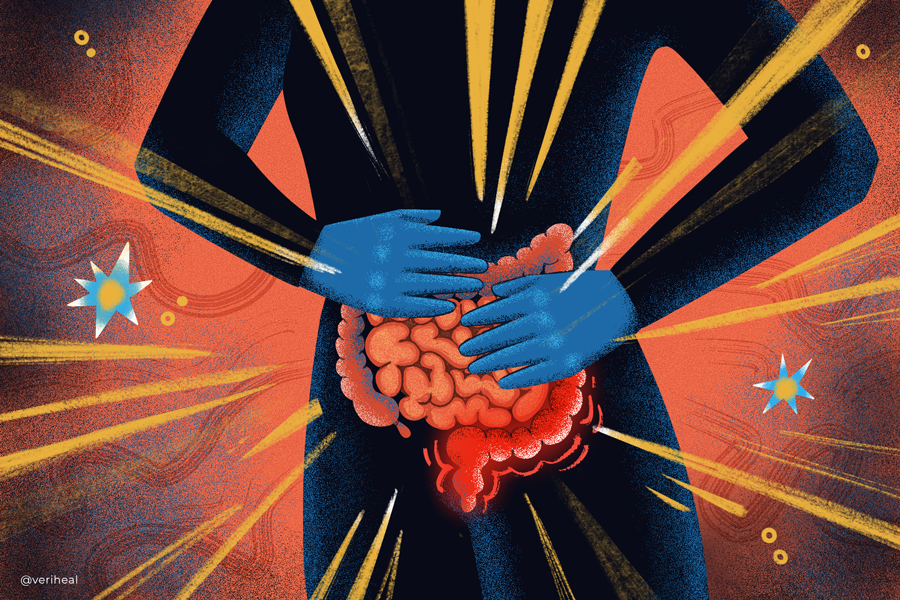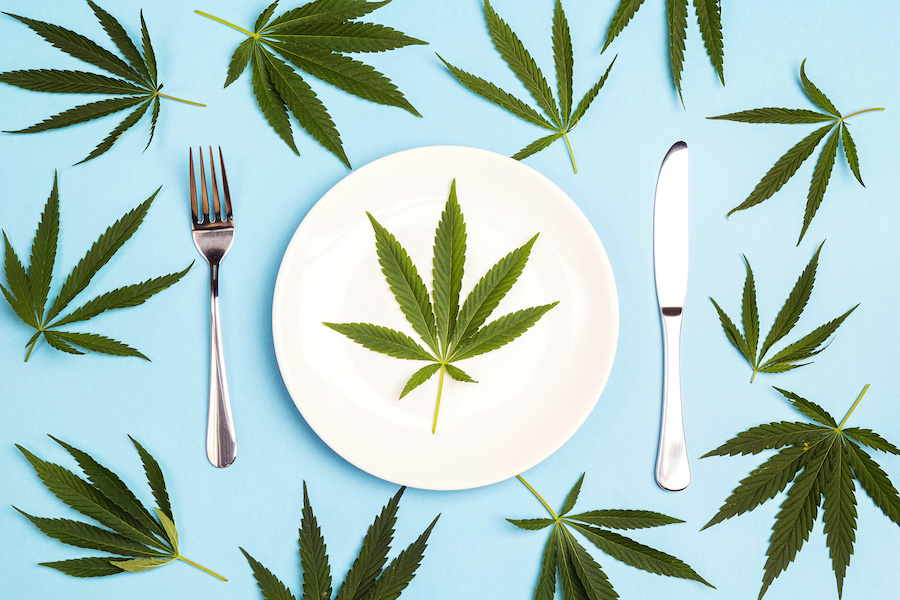Inflammatory Bowel Disease and Medical Cannabis
- Cannabis for Inflammatory Bowel Disease
- Taking Advantage of Cannabinoids for Inflammatory Bowel Disease
- Inflammatory Bowel Disease Causes and Symptoms
Crohn’s disease and ulcerative colitis (UC) together create the broad category of inflammatory bowel disease (IBD). While Crohn’s disease can affect all areas of the gastrointestinal tract, it most often harms the small intestine in a characteristic “skip lesion” pattern through bowel walls. UC occurs in the large intestine and rectum, affecting a thinner layer of cell walls. This prolonged irritation in the gastrointestinal (GI) tract caused by both conditions results in IBD, reports the U.S. Centers for Disease Control and Prevention (CDC) (4). Check out our guides on Crohn’s disease and ulcerative colitis for specific information about how cannabis can help your specific condition.
While there are several FDA-approved and disease-modifying treatments for this condition, the Crohn’s & Colitis Foundation acknowledges medical marijuana as an effective method of alleviating the symptoms of the condition (9). “Small studies have reported a significant proportion of patients with a history of abdominal surgery, chronic abdominal pain, and/or a low quality of life index,” according to the official foundation position statement. “Additionally, several studies show improvement of quality of life symptoms associated with IBD, including reduced pain, decreased nausea, and improvement in appetite and sleep (5).”
Researchers believe that the cannabis plant interacts with the body through the body’s endocannabinoid system (ECS), which consists of fat-based neurotransmitters that are responsible for modulating the body’s response to pain, reducing inflammation, and maintaining the body’s proper body temperature known as homeostasis.
When cannabis enters the body, its cannabinoids including delta-9-tetrahydrocannabinol (THC) and cannabidiol (CBD), bind to cannabinoid receptors CB1 and CB2. CB1 receptors typically affect the central nervous system (CNS) while CB2 receptors are located in soft tissues, immune cells, and various organs.
Researchers in the International Journal of Molecular Sciences, as well as in other gastroenterology-related journals, believe that when cannabinoids activate the CB2 receptors found in the lining of intestinal tissue, P-glycoprotein (P-gp) is released and slows the body’s attack on itself by white blood cells called neutrophils (1) (2) (10).
Check out our guide on the endocannabinoid system for more information on how it works.
Cannabis for Inflammatory Bowel Disease
The symptoms and associated risks of inflammatory bowel disease are quite horrible for anyone to deal with. Luckily, reducing inflammation is one of cannabis’ most used medical benefits. Due to the severity of IBD symptoms that individuals deal with, they often try alternative treatments in search of something that will help. Most conventional methods of treating and alleviating symptoms are often accompanied by the adverse effects and side effects associated with pharmaceutical medication and treatments.
Recently, as many as 67% of IBD patients have turned towards medical marijuana with claims of pain relief, alleviate nausea, stimulate appetite, better sleep, reduced inflammation, and even a reduced need for pharmaceutical medication (2) (3). In addition, 33% of patients with UC and 50% of Crohn’s disease patients report that they are cannabis users for symptomatic relief for abdominal pain, diarrhea, and poor appetite (1).
A preclinical study done on animals revealed that THC was the most effective cannabinoid, while CBD was ineffective on its own for IBD (6). The study induced colitis in rodents in order to assess the effectiveness of THC and CBD as potential treatments. Unsurprisingly, the researchers found that THC and CBD were even more effective when they were combined with a lower dose of THC to CBD, as opposed to when they were administered in isolation. The study concluded with satisfactory results and have stated that the future of IBD treatment could be a THC and CBD combination (6).
A 2019 study has even shown that cannabis use was associated with a significant reduction in the risk of certain complications such as partial or total colectomy and bowel obstruction when compared to those who do not consume cannabis. They also tended to have shorter hospital stays (8).
Professionals agree that the current pharmaceutical medications and treatments available are not meeting all the needs of patients with this condition, and with such persistent symptoms, their quality of life is reduced.
Taking Advantage of Cannabinoids for Inflammatory Bowel Disease
Avoiding surgery is a very important goal for any patient, so a successful treatment is critical. As noted, medicinal marijuana use may supportively alleviate uncomfortable symptoms of IBD, with several research reports showing how. A 2016 report from Gastroenterology & Hepatology suggests that “cannabis use should be reserved for symptomatic control in patients with severe IBD refractory to the currently available standard-of-care and complementary and alternative medicines (1).”
In 2018, the journal interviewed University of Michigan Medicine Assistant Professor of Medicine Jami Kinnucan, MD, confirming marijuana directly benefits IBS in an age of no answers: “There is currently a large unmet need in the treatment of inflammatory bowel disease with conventional medical therapy,” said Dr. Kinnucan. “Despite improvement in disease activity, many patients have persistent clinical symptoms that have a significant impact on their quality of life (7).”
Anyone considering medical cannabis for this condition should check with their physician/gastroenterologist and a medical marijuana doctor. More research and clinical trials are needed to fully understand how cannabinoids help those suffering from GI pathologies. Currently, there isn’t enough evidence to demonstrate a strong enough disease-modifying effect by these chemicals, the way other currently established treatment options do.
IBD patients can potentially face serious complications if not treated adequately by a professional healthcare team. Here is a quick summary of the potential effects of cannabis for patients with this condition (2):
- Reduce inflammation
- Alleviates pain and nausea
- Reduce the risks of further complications
- Improve the quality of life
- Improve appetite, which helps maintain weight
- Alleviates stress and anxiety
Inflammatory Bowel Disease Causes & Symptoms
The CDC reports that there is no exact origin of this condition. IBD disorders are considered autoimmune diseases. Autoimmune disease occurs when the body’s immune system thinks there is a foreign invader in the body and attacks healthy tissue. When it comes to IBD this means that the body attacks the intestines, which causes severe pain, inflammation, and eventually leads to damage of the intestinal tissues. The gastrointestinal tract inflames when the immune system cannot correctly process environmental triggers, and often is hereditary.
Inflammatory Bowel Disease (IBD) is an umbrella term used for disorders that include chronic inflammation of the digestive tract. According to the Mayo Clinic, there are different types of IBD which include ulcerative colitis (UC) and Crohn’s disease. UC is a condition that causes long-lasting inflammation and ulcers (sores) in the innermost lining of the individual’s large intestine and rectum. Crohn’s disease is also a condition that causes inflammation, but it affects the entire length and lining of the digestive tract, which then spreads deeply into the affected tissues.
Both conditions are often associated with severe diarrhea, abdominal pain, cramping, fatigue, fever, reduced appetite, and weight loss. They can both also lead to serious life-threatening complications. The exact causes are still unknown but risk factors such as age, race, family history, cigarette smoking, anti-inflammatory as well as environmental factors such as where the individual lives. Factors such as diet and stress are known to aggravate patients, but they do not cause it.
Individuals suffering from IBD are at greater risk of colon cancer, skin inflammation, eye inflammation, joint inflammation, blood clots as well as possible liver damage from primary sclerosing cholangitis because of IBD. Additionally, individuals specifically with Crohn’s disease may risk bowel obstruction, malnutrition, ulcers, fistulas, and anal fissure. Individuals specifically with UC may be at risk of toxic megacolon, holes in the colon, and severe dehydration.
Note: Veriheal does not intend to give this as professional medical advice. Do not attempt to self-diagnose, or prescribe treatment based on the information provided on this page. Always consult a physician before making any decision on the treatment of a medical condition.
1. Ahmed, W., & Katz, S. (2016). Therapeutic Use of Cannabis in Inflammatory Bowel Disease. Gastroenterology & hepatology, 12(11), 668–679. https://www.ncbi.nlm.nih.gov/pmc/articles/PMC5193087/
2. Almogi-Hazan, O., & Or, R. (2020). Cannabis, the endocannabinoid system And Immunity—the journey from the bedside to the bench and back. International Journal of Molecular Sciences, 21(12), 4448. https://www.mdpi.com/1422-0067/21/12/4448/htm
3. Ambrose, T., & Simmons, A. (2018). Cannabis, cannabinoids, and the Endocannabinoid System—Is there therapeutic potential for inflammatory BOWEL DISEASE? Journal of Crohn’s and Colitis, 13(4), 525-535. https://academic.oup.com/ecco-jcc/article/13/4/525/5173479#132888508
4. CDC -What is inflammatory bowel disease (ibd)? – inflammatory bowel disease – division of population health. (2018, March 22). Retrieved April 02, 2021, from https://www.cdc.gov/ibd/what-is-IBD.htm
5. Foundation Position Statement: Medical Cannabis. (2019, March). Retrieved April 02, 2021, from https://www.crohnscolitisfoundation.org/sites/default/files/legacy/resources/MedicalCannabis-Position-2018-Final-002.pdf
6. Jamontt, J. M., Molleman, A., Pertwee, R. G., & Parsons, M. E. (2010). The effects of Delta-tetrahydrocannabinol and cannabidiol alone and in combination on damage, inflammation and in vitro motility disturbances in rat colitis. British journal of pharmacology, 160(3), 712–723. https://pubmed.ncbi.nlm.nih.gov/20590574/
7. Kinnucan, J., & Medicine, A. (2018, October). Use of medical cannabis in patients with inflammatory bowel disease. Retrieved April 02, 2021, from https://www.gastroenterologyandhepatology.net/archives/october-2018/use-of-medical-cannabis-in-patients-with-inflammatory-bowel-disease/
8. Mbachi, C., Attar, B., Oyenubi, O., Yuchen, W., Efesomwan, A., Paintsil, I., Madhu, M., Ajiboye, O., Simons-Linares, C. R., Trick, W. E., & Kotwal, V. (2019). Association between cannabis use and complications related to ulcerative colitis in hospitalized patients: A propensity matched retrospective cohort study. Medicine, 98(32), e16551. https://www.ncbi.nlm.nih.gov/pmc/articles/PMC6708902/
9. Medical cannabis. (n.d.). Retrieved April 02, 2021, from https://www.crohnscolitisfoundation.org/complementary-medicine/medical-cannabis
10. Picardo, S., Kaplan, G. G., Sharkey, K. A., & Seow, C. H. (2019). Insights into the role of cannabis in the management of inflammatory bowel disease. Therapeutic advances in gastroenterology, 12, 1756284819870977. https://www.ncbi.nlm.nih.gov/pmc/articles/PMC6727090/









